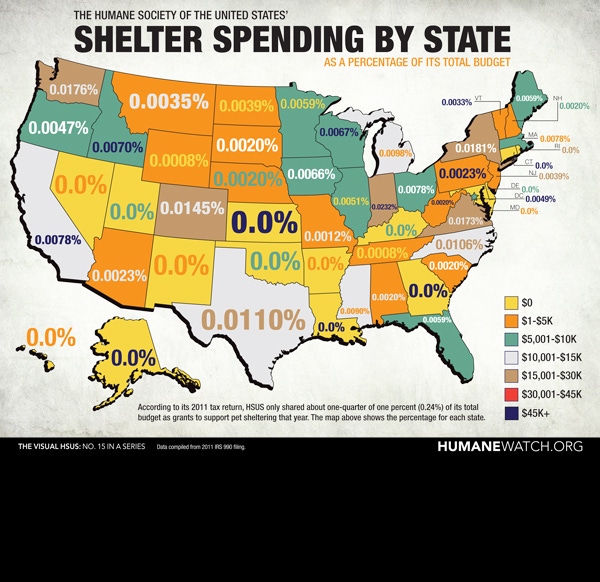February 1, 2013

The owner of New Fashion Pork has heard enough about the Humane Society of the United States (HSUS) pleading with people for donations through advertising campaigns that tug at peoples' heartstrings, according to a report in the Daily Globe, Worthington, MN. The HSUS has earned a D from www.CharityWatch.org, an organization that rates nonprofit groups based on how they spend the donations given to them. In the case of HSUS, a large share of the money they collect is used to pay attorney fees and lobbyists pushing a vegan agenda, according to some farm groups who are pushing back.
“Less than 1% of their actual budget goes to animal shelters,” says Brad Freking, owner of Jackson, MN-based New Fashion Pork. “They're being investigated for false advertising, pulling on peoples' heartstrings ... when all they're really trying to promote is the vegan agenda.”
Freking says the HSUS has done nothing to save local cats and dogs. Animal shelters in southwest Minnesota, and even the larger shelters in Sioux Falls, SD, have never received funding from HSUS. That's why Freking and the staff at New Fashion Pork, Minnesota's second-largest pork producer, ask that if people are going to donate money to animal care, they do so by giving to their local animal shelters.
“It's very clear what (the HSUS) agenda is, and it has nothing to do with cats and dogs,” Freking adds.
New Fashion Pork has chosen to speak up now about the ongoing HSUS tactics after recently learning of a Jackson woman who “left everything” to HSUS after her death. A member of that family has since said if she knew what HSUS really was, that never would have happened.
“That's our goal, to let the general public know that (HSUS) is so deceptive,” adds Emily Erickson, animal wellbeing and quality assurance manager for New Fashion Pork. “If there's any questions as to the organization you're donating to, go to www.CharityWatch.org.”
At the same time, they want other livestock producers to also take a stand against HSUS.
“They're trained to eliminate our business,” Freking says. “They want to do away with animal agriculture as we know it.”
“The HSUS agenda is to drive up food costs for animal proteins to make them less affordable and available to the average consumer,” Freking says.
As more people become aware of the HSUS agenda, contributions to the organization have dropped, Freking says. While overall charitable giving increased by 6 or 7% in 2012, HSUS’s total revenue has dipped by more than 10%.
Freking and Erickson hope that trend continues, and stress that if people want to donate money to help animals in need, they send their donation directly to their local animal shelter.
The HSUS is behind initiatives that have passed in several states to eliminate the use of individual sow housing (gestation crates) in sow facilities. Its push to remove the individual sow houses and, instead, have sows gestate together in a pen setting is “Chapter 1 of a 10-chapter playbook,” Freking says.
“Their agenda is to raise our cost of production over time so (pork) becomes less affordable to consumers, and therefore you decrease consumption over time,” he explains. “To communicate and work with these people (at HSUS), we're 180 degrees apart. We produce animal protein. They want to eliminate that.”
Freking says group gestation pens are considered more inhumane than keeping sows in individual sow houses.
“The University of Minnesota has researched sows in individual sow houses and group gestation pens and the data does not support group housing,” he says. “It's a more stressful environment for the sows, that's what the research shows. Everybody knows how aggressive big sows are,” he says, adding that research has shown the sows bite each other and attack each other when multiple sows are kept in the same pen.
“There's a reason boss sow came about,” Freking says. “They fight for dominance. By moving to loose sow housing, we also expose our employees to a more dangerous work environment.”
Today, nearly 99% of pork products come from animals housed in individual sow houses. New Fashion Pork has tried group gestation pens on one of its farms, and Freking says the farm has higher swine mortality rates and more injuries.
“From our standpoint, we don't see that as more humane,” he says. “There's a disadvantage to animal welfare and employee safety. You lose the ability to individually care for the animal.”
“There's been research done where they gave sows a choice -- they've inserted individual sow houses into group gestation pens and they chose the individual houses because they didn't have to fight for space,” Erickson adds. “Ninety percent of the time they'll spend in their individual space.”
Read more at http://www.equities.com/news/headline-story?dt=2013-01-31&val=989211&cat=material.
You May Also Like



